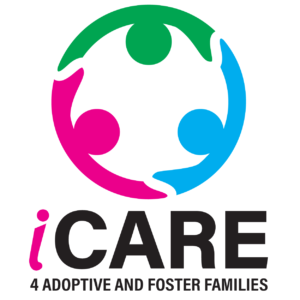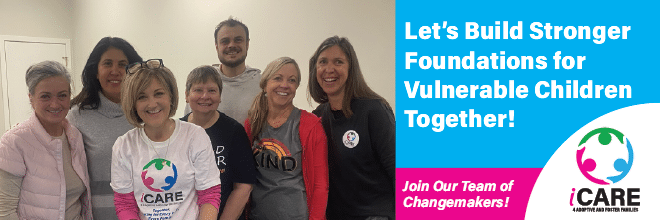- Legislative Update April 2025A Month of Inspiration and Collaboration! This past month, I had the incredible opportunity to attend a full-day meeting with some of the leading experts in child welfare and mental health, including Dr. Dana Weiner, Dr. Verletta Saxon, and the team from the National Center for Adoption Competency as part… Read more: Legislative Update April 2025
- Raising an Adoptive or Foster Child
 Navigating the complexities of adoption, foster care, and kinship can feel like managing seven layers of stress at once. From feelings of rejection and shame to the challenges of forming secure attachments, the emotional landscape for adopted children is uniquely layered. Understanding these core issues is crucial for caregivers and educators alike. As children grow through each developmental stage, the impact of trauma can shape their identities and relationships. Discover how we can transform stress into strength and support these children on their journey to healing and empowerment. Join us in exploring this vital topic!
Navigating the complexities of adoption, foster care, and kinship can feel like managing seven layers of stress at once. From feelings of rejection and shame to the challenges of forming secure attachments, the emotional landscape for adopted children is uniquely layered. Understanding these core issues is crucial for caregivers and educators alike. As children grow through each developmental stage, the impact of trauma can shape their identities and relationships. Discover how we can transform stress into strength and support these children on their journey to healing and empowerment. Join us in exploring this vital topic! - The Hidden Stress of Adoption, Foster Care, and Kinship
 When children experience adoption, foster care, or kinship placement, their stress often runs deeper than meets the eye. Beneath the surface, past trauma and disrupted attachments can leave lasting imprints on a child’s brain and emotional well-being. Understanding these hidden stressors is the first step in helping kids move from survival mode to a place of safety and healing.
When children experience adoption, foster care, or kinship placement, their stress often runs deeper than meets the eye. Beneath the surface, past trauma and disrupted attachments can leave lasting imprints on a child’s brain and emotional well-being. Understanding these hidden stressors is the first step in helping kids move from survival mode to a place of safety and healing. - A Love Note to Caregivers
 A Love Note to Caregivers Bless you, who show up not because it’s easy, but because of love. Because you know that love is worth the cost. I see you trying to balance the impossible: being presentbeing patientbeing enough for everyone. It’s love that stretches you beyond your limits. It’s… Read more: A Love Note to Caregivers
A Love Note to Caregivers Bless you, who show up not because it’s easy, but because of love. Because you know that love is worth the cost. I see you trying to balance the impossible: being presentbeing patientbeing enough for everyone. It’s love that stretches you beyond your limits. It’s… Read more: A Love Note to Caregivers - The Urgent Need for Collaboration: Public Safety Officers and Families in Supporting Foster, Adopted, and Kinship Children
 Children in foster, adoptive, and kinship care need strong, consistent, and supportive relationships—especially with their caregivers. When public safety officers or school professionals serve as a child’s primary source of comfort in a crisis, it’s important to be mindful that family bonds remain intact. 🤝 The solution? Collaboration and Training. By working together, public safety officers, educators, and caregivers can ensure that professional support strengthens family connections, helping children feel secure at home, at school, and in their communities.
Children in foster, adoptive, and kinship care need strong, consistent, and supportive relationships—especially with their caregivers. When public safety officers or school professionals serve as a child’s primary source of comfort in a crisis, it’s important to be mindful that family bonds remain intact. 🤝 The solution? Collaboration and Training. By working together, public safety officers, educators, and caregivers can ensure that professional support strengthens family connections, helping children feel secure at home, at school, and in their communities.
Legislative Update April 2025
A Month of Inspiration and Collaboration!This past month, I had the incredible opportunity to attend a full-day meeting with some of the leading experts in child welfare and mental health,

Raising an Adoptive or Foster Child
Navigating the complexities of adoption, foster care, and kinship can feel like managing seven layers of stress at once. From feelings of rejection and shame to the challenges of forming secure attachments, the emotional landscape for adopted children is uniquely layered. Understanding these core issues is crucial for caregivers and educators alike. As children grow through each developmental stage, the impact of trauma can shape their identities and relationships. Discover how we can transform stress into strength and support these children on their journey to healing and empowerment. Join us in exploring this vital topic!

The Hidden Stress of Adoption, Foster Care, and Kinship
When children experience adoption, foster care, or kinship placement, their stress often runs deeper than meets the eye. Beneath the surface, past trauma and disrupted attachments can leave lasting imprints on a child’s brain and emotional well-being. Understanding these hidden stressors is the first step in helping kids move from survival mode to a place of safety and healing.

A Love Note to Caregivers
A Love Note to Caregivers Bless you, who show up not because it’s easy, but because of love. Because you know that love is worth the cost. I see you

The Urgent Need for Collaboration: Public Safety Officers and Families in Supporting Foster, Adopted, and Kinship Children
Children in foster, adoptive, and kinship care need strong, consistent, and supportive relationships—especially with their caregivers. When public safety officers or school professionals serve as a child’s primary source of comfort in a crisis, it’s important to be mindful that family bonds remain intact.
🤝 The solution? Collaboration and Training. By working together, public safety officers, educators, and caregivers can ensure that professional support strengthens family connections, helping children feel secure at home, at school, and in their communities.

The Essential Role of School Social Workers in Fostering Family Bonds and Belonging
School social workers play a vital role in supporting foster, adoptive, and kinship children—but their impact is most powerful when they work alongside caregivers. Without intentional collaboration, children may form strong attachments at school that unintentionally sideline their caregivers, creating emotional disconnects at home. By bridging the gap between school and family, social workers help children build secure bonds in both environments, fostering a true sense of belonging.

